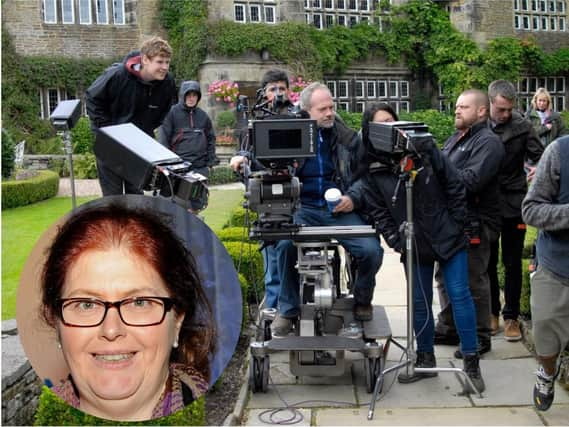Yorkshire women say me too behind the cameras


Even in today’s climate of “Time’s Up” and “#Me Too” protest movements, the entertainment industry remains dominated, one of its leaders said last night, by a “golden circle” of mostly men, among whom the best jobs are divided.
READ: Channel 4 drama filmed in Halifax led the way at television awardsKate Kinninmont, head of Women in Film and Television, warned that producers would never harness the best talent in Britain if they stuck to the “same old, same old”.
Advertisement
Hide AdAdvertisement
Hide AdLaunching a new film-making initiative, she said: “Women made the first-ever narrative films, and then once it became an industry and went to Hollywood and financiers got involved, women got pushed aside into jobs where they were taking care of things rather than directing and writing themselves.
“In the 21st century, more young women than young men come out of our film schools, and yet when we look at what is happening in feature films, things really haven’t got better.”
Her new project, Female Film Force, sponsored by the dating service, Bumble, and aiming to capitalise on the climate change triggered by Hollywood’s season of sex scandals, will see five female teams handed £20,000 each to make a short film.
“This is a year of change,” Ms Kinninmont said. “Now companies are phoning up saying, ‘Have you got any woman directors?’ Suddenly it’s all changed.”
Advertisement
Hide AdAdvertisement
Hide AdREAD: Sneak peek of upcoming Sally Wainwright drama set and filmed at Shibden Hall in new BBC trailerAfter decades of dismissal, a similar wind of change is blowing through the production industry in Yorkshire, other experts said.
Ruth Pitt, a journalist who became one of the North’s most successful independent producers, said the region had its own “golden circle” which had historically downplayed the role of women.
Their contribution to the success of Yorkshire Television had been largely ignored in the station’s 50th anniversary celebrations last month, she said.
“It’s partly because of that lack of encouragement that women don’t see themselves doing the big jobs, and it becomes self-perpetuating,” Ms Pitt said.
Advertisement
Hide AdAdvertisement
Hide AdNoting that this was also the 50th anniversary of the seminal Mel Brooks comedy, The Producers, she added: “He had no experience as a director and yet he persuaded the studio to let him direct it. I just wonder whether they would have taken the same risk on a woman.
“It’s about women not seeing anybody else doing the job and therefore not seeing themselves doing it.
“But it is now changing. There’s a tipping point, and ironically women are now employing in their own image, so they’re probably more likely to take on other women.”
READ: Last Tango in Halifax and Happy Valley voted in top six of Yorkshire's greatest television shows of all timeThe casting as the new Doctor Who of Jodie Whittaker, who is from Skelmanthorpe, near Huddersfield, is the most recent shattering of the glass ceiling. And Yorkshire’s roster of top screenwriters includes Kay Mellor, who created Fat Friends, Sally Wainwright, who wrote Last Tango In Halifax, and Gwyneth Hughes, who is behind this season’s ITV adaptation of Thackeray’s Vanity Fair.
Advertisement
Hide AdAdvertisement
Hide AdAnother of their number, Leeds-based Lisa Holdsworth, who has written for Channel Four’s Ackley Bridge, said: “Part of the problem is the risk-aversion that broadcasters and producers seem to suffer from. And what seems to constitute a risk is anyone who isn’t white, straight, able-bodied and male.
“But with such a plethora of viewing options now available, UK producers and broadcasters are genuinely at risk if they do not start catering for a diverse audience. They will simply go elsewhere for entertainment.”